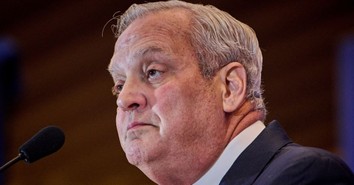10 Faith-Inspired Summer Reading Books to Enrich Your Faith and Mind This Summer

Memorial Day, the unofficial start of summer, is now behind us. That means it’s time for my annual summer reading list (You can find last year’s list here.). Usually, these are the top 10 books that I have either read over the past year or are at the top of my list to read over the summer. Most of the time, they are new books, with perhaps a few older works that I have newly discovered myself. Occasionally, I offer a classic that I decided to re-read. As an eclectic reader, they tend to be a blend of history, fiction, biography, current events, science, and more.
Enjoy.
1. Cooper, Paul. Fall of Civilizations: Stories of Greatness and Decline. This was the first book I’ve read by Paul Cooper, but it won’t be the last. It was based on a popular podcast with more than 100 million downloads. It examines various civilizations that rose to power and then collapsed. From the Sumerians to Roman Britain, the Mayans to the Incas, it is great storytelling. And more than a bit unnerving as you continually find yourself immersed in what it would be like to witness the end of the world.
2. Douthat, Ross. Believe: Why Everyone Should Be Religious. Douthat is a writer for the New York Times and one of its few conservative, Christian voices. His most recent book attempts to show the reasonableness of faith. It is refreshing to read someone demonstrating how science can bolster belief, that mystical experiences are not ridiculous, and why open-minded reason should actually pull someone toward God. Those wanting Douthat to end the book with a Billy Graham-style altar call to evangelical Christianity will be disappointed. Yes, he ends with why he is a Christian, but he will be happy if, at the end, people will simply be open to the idea of religion itself. In this post-Christian world, that’s not a bad place to start.
3. Grinspan, John. The Age of Acrimony: How Americans Fought to Fix Their Democracy, 1865-1915. This book first came to my attention after hearing that it was considered essential reading for many members of Congress on both sides of the aisle. I can see why. In the decades following the Civil War, many thought that democracy in the U.S. was broken. See if this sounds familiar: “Shaken by economic and technological disruption, they sought safety in aggressive, tribal partisanship.” Reformers eventually prevailed, and civility was restored. It’s worth reading how.
4. Haidt, Jonathan. The Anxious Generation: How the Great Rewiring of Childhood is Causing an Epidemic of Mental Illness. In an article for the Atlantic, Haidt proposed the idea of the “coddling of the American mind.” It explored the movement to “scrub” our world clean of “words, ideas, and subjects that might cause discomfort or give offense.” It became the basis for a bestselling and provocative book. Haidt offers another incisive cultural analysis in his most recent book, this time exploring youth mental health. Rates of depression, anxiety, self-harm and suicide have risen sharply. Why? His conclusions will challenge and awaken.
5. Harari, Yuval Noah. Nexus: A Brief History of Information Networks from the Stone Age to AI. Harari’s first book, Sapiens, was lauded by Mark Zuckerberg and Barack Obama. Bill Gates said it would be one of 10 books he would take to a desert island. He serves up big ideas in easily digestible bites. In his first book, Harari detailed how humankind came to rule the planet. In this, his fifth book, he tackles how information networks have made, and unmade, our world. His three large sections – human networks, the inorganic network, and computer politics – provide a framework for a fascinating journey. As with his earlier books, you won’t always agree with his presuppositions, much less his conclusions, but it will consistently stretch your thinking.
6. Hendrix, John. The Mythmakers: The Remarkable Fellowship of C.S. Lewis and J.R.R. Tolkien. The mark of a good book is when you are sad when you come to its end. This exceptionally well-informed and researched book, creatively presented as a graphic novel, is simply one of the best introductions to Lewis and Tolkien around. It explores their personal biographies, their friendship, their creativity, their thinking, their motivations, and, of course, their faith. I’ve read numerous works on both of their lives and was impressed by how much Hendrix pulled together. Even to someone familiar with almost all that he wrote, I have seldom enjoyed reading a book more. You walk away with the enchantment of the worlds they created and the joy God had in bringing them together to spur each other’s creativity.
7. Ortlund, Gavin. What It Means to Be Protestant: The Case for an Always-Reforming Church. There was a reason for the Protestant Reformation. There is a reason why so many are Protestants to this day. I stand among them. Ortlund’s highly lauded work deserves its praise. Exploring three major areas – Protestantism and Catholicity, Protestantism and Authority, and Protestantism and History – he makes a winsome and compelling case for the Protestant tradition. As the back cover of the book rightly maintains, “He shows that historic Protestantism offers the best pathway to Catholicity and historical rootedness for Christians today.”
8. Presley, Stephen O. Cultural Sanctification: Engaging the World like the Early Church. Many believe there are clear parallels between our post-Christian world and the pagan culture hostile to Christianity during the first few centuries of its growth. And grow it did. By A.D. 100, there were around 7,500 followers of Jesus. By the mid-300s, there were more than 30,000,000. I do not believe that the practices and methods, strategies and styles of the early Church provide marching orders for our day. They should not be considered normative. But my, my, my, they should be wildly informative. Presley’s five areas of exploration – identity, citizenship, intellectual life, public life and hope – provide clear road maps to consider for our day.
9. Rees, Laurence. The Nazi Mind: Twelve Warnings from History. The writings of historian Laurence Rees have appeared before in this annual list of suggestions, specifically The Holocaust: A New History and Hitler’s Charisma: Leading Millions in the Abyss. His history of Auschwitz is also highly recommended. Along with Richard J. Evans, he is one of the world’s greatest living historians of Nazi Germany. This may be his most chilling and eye-opening offerings to date. He tackles head-on the question that so many have asked over time: How could the Germans have done this? His 12 “warnings” are meant to echo throughout time, and well they should. Many of them read like today’s newsfeed.
10. Smith, Christian. Why Religion Went Obsolete: The Demise of Traditional Faith in America. The research and writings of sociologist Christian Smith are no strangers to readers of my books and blogs. While the “rise of the nones” is now commonly understood, what Smith does in his most recent book is examine “why” this has happened. Drawing on survey data and hundreds of interviews, Smith offers the best analysis to date of why so many Americans have lost their faith in traditional religion. This is simply required reading for anyone wanting to understand the past, present and future of American spirituality.
James Emery White
Photo Courtesy: ©Pexels/Kaboompics.com
Published Date: May 29, 2025
James Emery White is the founding and senior pastor of Mecklenburg Community Church in Charlotte, NC, and a former professor of theology and culture at Gordon-Conwell Theological Seminary, where he also served as their fourth president. His latest book, Hybrid Church: Rethinking the Church for a Post-Christian Digital Age, is now available on Amazon or from your favorite bookseller. To enjoy a free subscription to the Church & Culture blog, visit churchandculture.org where you can view past blogs in our archive, read the latest church and culture news from around the world, and listen to the Church & Culture Podcast. Follow Dr. White on X, Facebook, and Instagram at @JamesEmeryWhite.
Originally published May 29, 2025.







